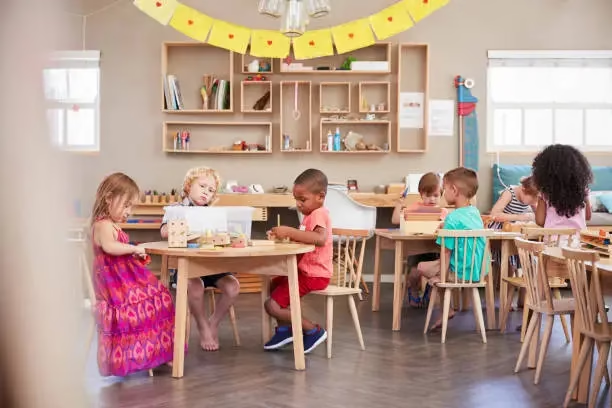Montessori practices emphasize hands-on learning, as opposed to learning with a digital piece. But, from a parent’s digital perspective, learning technology has to be integrated for future learning.
Montessori parents often wonder whether students use computers, tablets, or other digital devices in Montessori education and how these tools align with the school’s philosophy. By explaining how and why Montessori Classrooms Have Electronics, this perspective prepares parents for what to expect in a modern Montessori environment.
Do Montessori Classrooms Have Electronics?
Do Montessori classrooms have electronics?” can be answered in a straightforward manner without losing sense. Montessori Philosophy does not support the total absence of devices. Electronics are used marginally and solely to enhance the learner’s experience.
Lower Montessori classrooms have an extremely limited use of electronics. The objective of learning in these classrooms is to engage the senses and to solve problems with their hands.
In the upper grades, students use electronics for research, digital creativity, and project completion.
In summary, Montessori classrooms do use electronics.
These aren’t toys but rather learning tools. They shouldn’t take the place of activities that are done with their hands.
Why is Limiting Electronics Learning Important in Montessori Education
Understanding the scope of electronics in the Montessori classrooms helps the parents appreciate the rationale.
Montessori Education Also Focuses On:
Focus Learning: Environments that contain screens increase the likelihood of children being overstimulated and losing focus. Montessori classrooms include handheld and hands-on activities designed to maintain children’s attention.
Imagination and Problem Solving: Children learn new and inventive ways to think through the use of blocks, puzzles, and various other manipulatives.
Self-Reliance: Students learn to focus and manage their learning environments without the help of technology.
Interpersonal Relationships: Real-life socio-economic tasks improve communication and collaboration.
Safeguarding the core Montessori principles is of utmost importance, which is why Montessori Classrooms Have Electronics only in situations where the learning and social opportunities provided by technology outweigh the core Montessori values. This careful approach ensures that technology supports, rather than replaces, hands-on learning and meaningful social interactions.
Use of Electronics in Montessori Classrooms
Now let’s look at the activities that involve the use of electronics in Montessori classrooms:
Information Gathering: Older students compile information to prepare their presentations.
Integration: Students’ digital art or music can enhance and complement a creative activity in the classroom.
EdTech: Incorporating other technology within the classroom while students use various apps that reinforce the concepts of math, language, or geography.
Multimedia: The use of short video clips to help explain complicated concepts is used as a teaching aid.
In every Montessori classroom, the use of electronics is purposely designed to minimize any potential distractions.
Integration of Technology in Montessori Classrooms
Technology Integration with Montessori Classrooms has drawbacks, but can be beneficial when done properly.
Responsible Digital Citizenship: Students will be taught to engage with technology and the internet wisely and with socially accepted behavior.
Learning Without Boundaries: Advanced technology allows students to overcome difficult concepts and expand their learning with the use of concepts.
World Awareness: Through the internet, the world is at their fingertips.
Flexible Instruction: Provides easy modification to learning materials for each student when different levels of coursework and adaptive learning are readily available to them.
With these benefits of managed technology use, Technology Integration in Montessori classrooms is appropriate on a managed basis, as these are benefits to learning.
For parents applying Montessori education at home, how might this look?
Even though Montessori Classrooms Have Electronics to enhance learning, parents should still limit the amount of time their child spends on devices to reduce excessive screen exposure. It’s important to promote learning through a variety of hands-on activities and encourage children to use technology as a tool for discovery and creativity rather than making it the central focus of their play or study time. This balanced approach supports the Montessori philosophy of mindful and purposeful learning.
How do Montessori Schools Manage the Balance between Use of Technology and Traditional Methods?
Some schools like Garden Montessori and other Modern Montessori Nurseries have email blended Old and New practices to satisfy the needs of their young students in a tech-oriented environment. This looks like:
- Electronics are gradually introduced.
- Use remains appropriate and monitored at all times.
- Hands-on learning is still the primary focus of the curriculum and continues to be.
- Students are able to learn traditional skills while gaining digital competency.
Due to the primary focus of Montessori philosophy, traditional methods and new technology, and teaching practices, Montessori classrooms can approach the modern age.
Conclusion
While Montessori education strives to limit the use of electronic devices, it would be inaccurate to say that Montessori Classrooms Have Electronics completely excluded from the learning experience. In fact, Montessori Classrooms Have Electronics integrated thoughtfully to enhance specific lessons and support modern learning needs. Montessori schools provide students with the best of both worlds—a traditional, hands-on education enriched by the selective and purposeful use of modern technology.
FAQs
Do all Montessori classrooms have electronics?
Not all. Younger classrooms often avoid using devices, while older classrooms may use them sparingly.
Are electronics used daily in Montessori classrooms?
No. They are used intermittently for research and specific projects.
Can electronics harm Montessori learning?
Excessive use of electronics might, but controlled use definitely improves the learning experience.
How can parents complement Montessori technology use at home?
Encouraging hands-on activities while integrating online activities that promote creative learning.
Do Montessori schools teach digital literacy?
Of course! Older students are taught technology use and digital responsibility in a structured manner.



